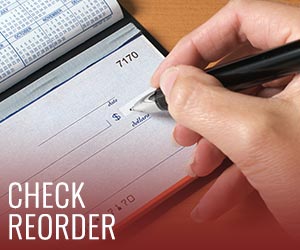Security
At National Grand Bank, Security is our top priority.
How National Grand Bank is Protecting YOU
NGB employees will NEVER ask you for your online banking password or ATM or Debit Card PIN. If anyone does ask you for those, they are scamming you, and you should hang up immediately and call NGB at 781-631-6000 to report it.
There are several ways that National Grand bank might contact you to discuss your current or potential accounts or other aspects of your relationship with National Grand Bank, including phone, mail, and email. We will only send you a text message if we have met you personally, or in the process of Multifactor Authentication which you would have initiated.
If any part of a conversation with someone from NGB who reaches out to you seems strange, such as asking for your social security number, date of birth, or other personal identifying information, hang up and call the bank directly at 781-631-6000 to verify that you are speaking with an actual employee of NGB before proceeding.
Reporting Fraud or Suspicious Activity
If you notice any unusual activity with your NGB bank accounts, call NGB customer Service immediately at 781-631-6000
Financial Identity Theft occurs when someone impersonates you to commit fraud, usually by creating accounts in your name. If you are the victim of Identity Theft:
- Contact NGB at 781-631-6000
- Contact the FBI – https://www.identitytheft.gov
- Initiate a fraud alert by contacting any one of the following credit bureaus:
- Experian: 888-397-3742
- TransUnion: 800-680-7289
- Equifax: 888-766-0008
If you receive a suspicious email, text message or phone call that appears to have originated at NGB, start by contacting NGB Customer Service at 781-631-6000. If it is a suspicious text message, you could also forward it to 7726 (“SPAM”) and follow your cell phone provider’s instructions.
If you have been the victim of fraud, you should report this fraud to your local police as well as the FBI at (202) 324-3000, or online at www.fbi.gov or tips.fbi.gov
Learn more about Fraud, Scams & protecting your accounts
Follow these simple ways to protect yourself:
- Keep your account contact information up to date. If your mailing address, phone number, or email address are out of date, we may not be able to contact you in the event of suspicious account activity.
- Use strong passwords. EVERY password for bank-related accounts must be unique, and it must be strong. Refer to the FBI’s tips on passwords here https://www.fbi.gov/contact-us/field-offices/phoenix/news/press-releases/fbi-tech-tuesday-strong-passphrases-and-account-protection
- Use Multifactor Authentication to ensure only you can gain access to your accounts.
- Turn on mobile push alerts to be instantly informed when there is any activity on your accounts
- Lock your personal electronics – turn on self-locking screen savers, and require biometrics or passwords to unlock them
We strongly recommend that our Commercial Customers protect yourselves by performing an Online Banking Services Risk Assessment and Controls Evaluation
Additional Security and Fraud Resources
- ACFE – tools for organizations to protect against fraud
- FBI – Federal Bureau of Investigations
- Steps to protect yourself: https://www.fbi.gov/video-repository/portland-cyber-home-102121.mp4/view
- Report Cyber Crime: https://www.ic3.gov/
- Report Identity Theft: https://www.identitytheft.gov
- General FBI Tips form: https://tips.fbi.gov/contact
- The Daily Scam – a great resource for knowing and averting the latest scams.

